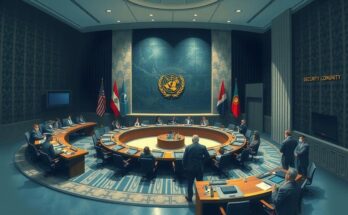Syria’s recovery, especially in Jobar, faces immense challenges post-civil war due to extensive destruction, a lack of funding and skilled labor, and opaque property rights. Ahmad Al Shara’s leadership brings mixed feelings about reconstruction efforts. The economy is hampered by a volatile currency, making international investment difficult, while fears of corruption cloud the rebuilding efforts.
In the wake of Bashar Al Assad’s regime, the recovery process in Syria, particularly in Jobar—a suburb of Damascus devastated during the civil war—remains daunting. Despite Assad’s publicized visits to celebrate areas he regained, the destruction in Jobar illustrates the extensive damage requiring attention. Reconstruction is complicated not only by physical ruin, with nearly every building destroyed, but also by a lack of funding, skilled labor, and raw materials.
The aftermath of the siege left Jobar and similar areas with a significant shortage of resources and a major demographic shift, as many capable professionals have fled the country. Challenges include a volatile currency affecting business operations, and a general breakdown in educational and public services. The UN estimates that one-third of Syrian housing is either destroyed or damaged, adding urgency to rebuilding efforts that face systemic challenges.
Legal ambiguities complicate property rights, creating obstacles to development in a market rendered opaque by decades of corruption and mismanagement. As the region struggles with governance under new leaders like Ahmad Al Shara, who have links to past extremist affiliations, skepticism about their ability to manage reconstruction and attract international investment prevails. Local residents remain wary, fearing that opportunists might monopolize reconstruction efforts.
Recent encounters between former residents and prospective investors indicate a reluctance to engender trust in the property market, with evictions occurring under duress from local armed groups. The oppressive business environment, reinforced by an informal control system, may dissuade reconstruction investments essential for progress. Thus, the cycle of dependency on personal initiatives to restore basic services instead of large-scale projects persists.
Despite some easing of international sanctions, substantial funds required for rebuilding are still lacking. Experts suggest a cautious approach towards creating reliable institutions capable of attracting foreign investments. Without swift action, vague assurances from new Syrian leadership may lead to disillusionment among locals, leading to further unrest in a nation bound by collective memories of losses during the war.
The path to recovery in Syria is fraught with challenges, including widespread destruction, economic instability, and a lack of international investment. Leadership transitions have yet to inspire confidence, and the legal and operational landscapes remain complicated by historical precedents of corruption. For meaningful reconstruction to occur, significant infrastructural commitments and concerted efforts towards transparent governance are essential.
Original Source: www.thenationalnews.com




